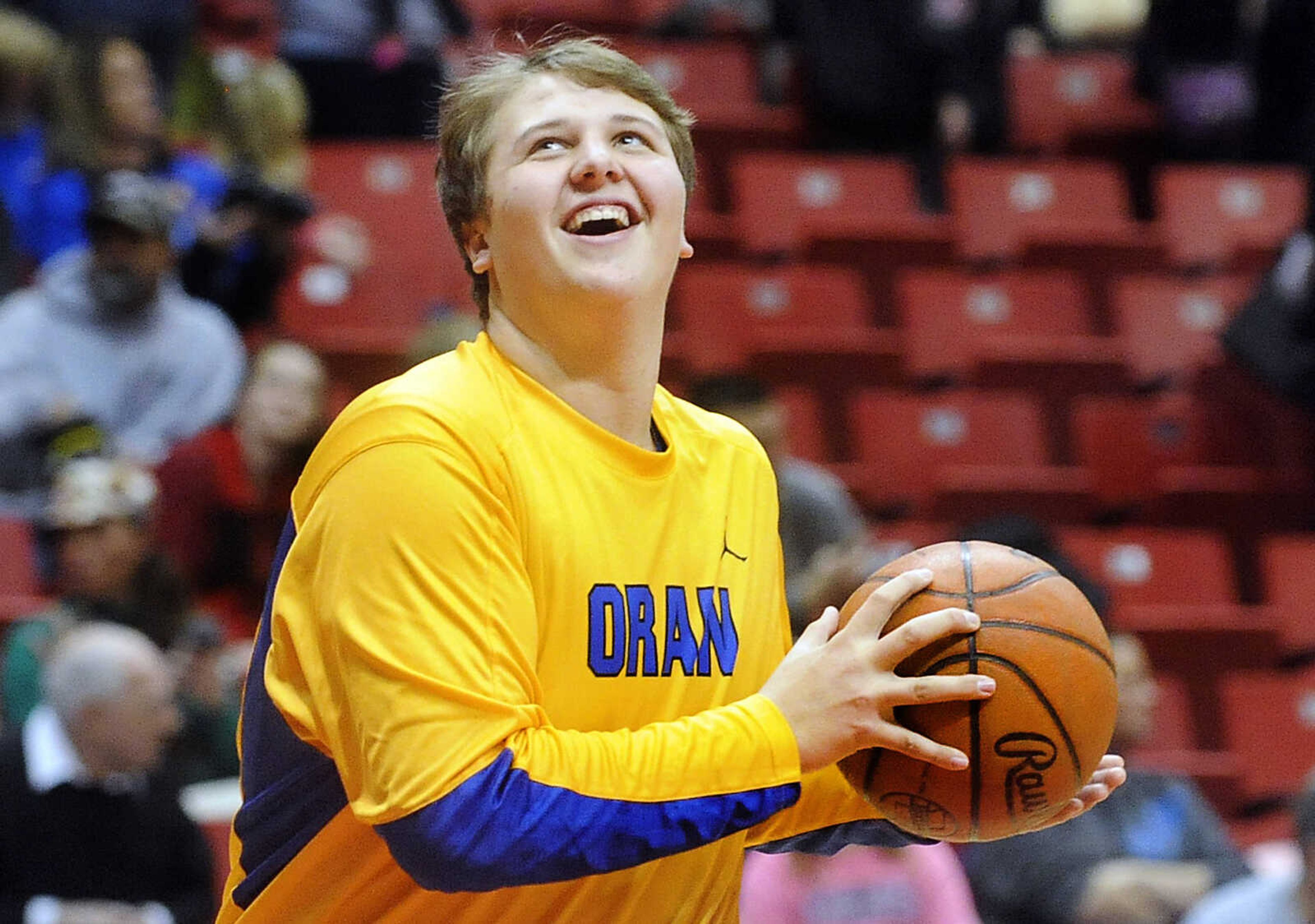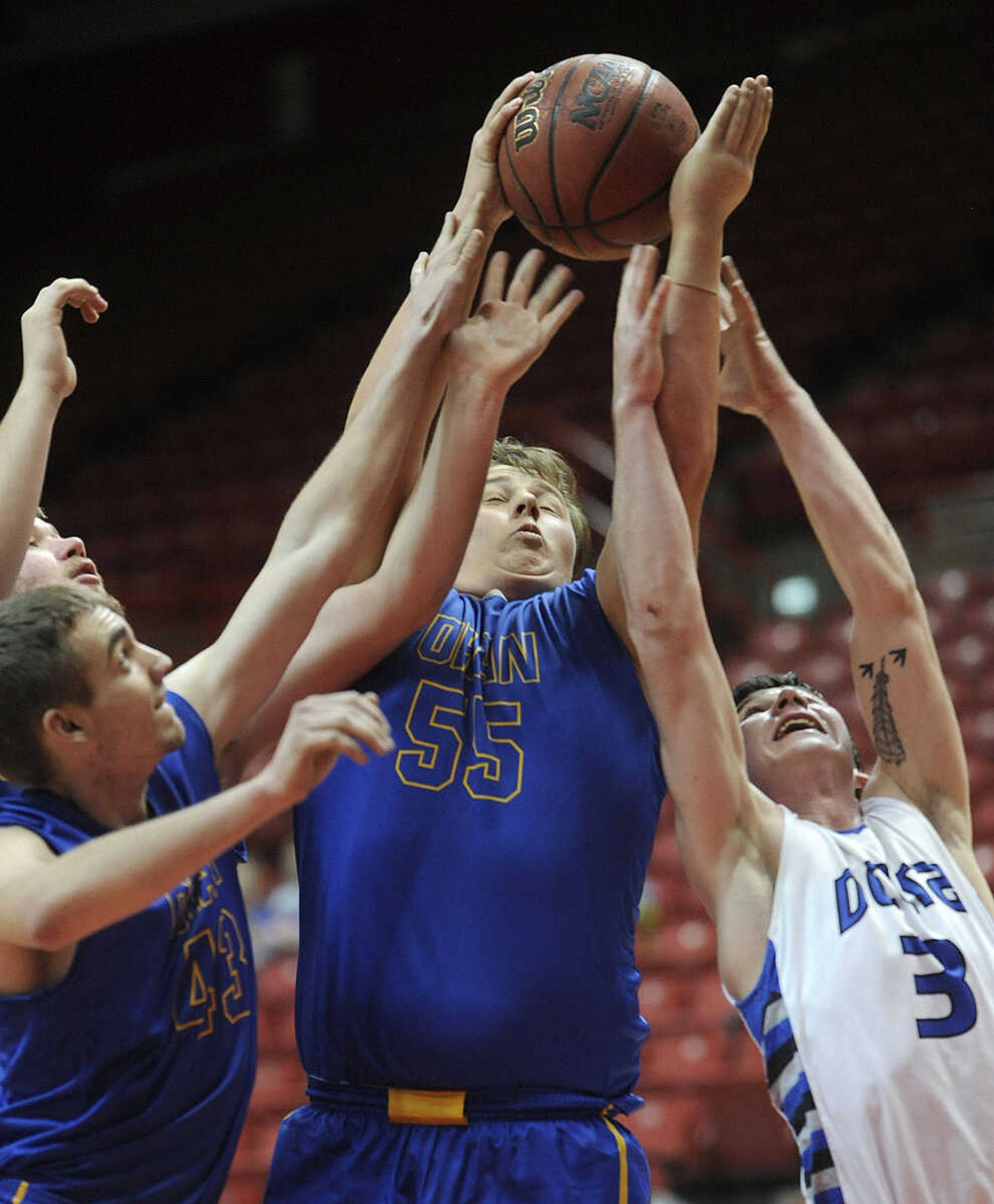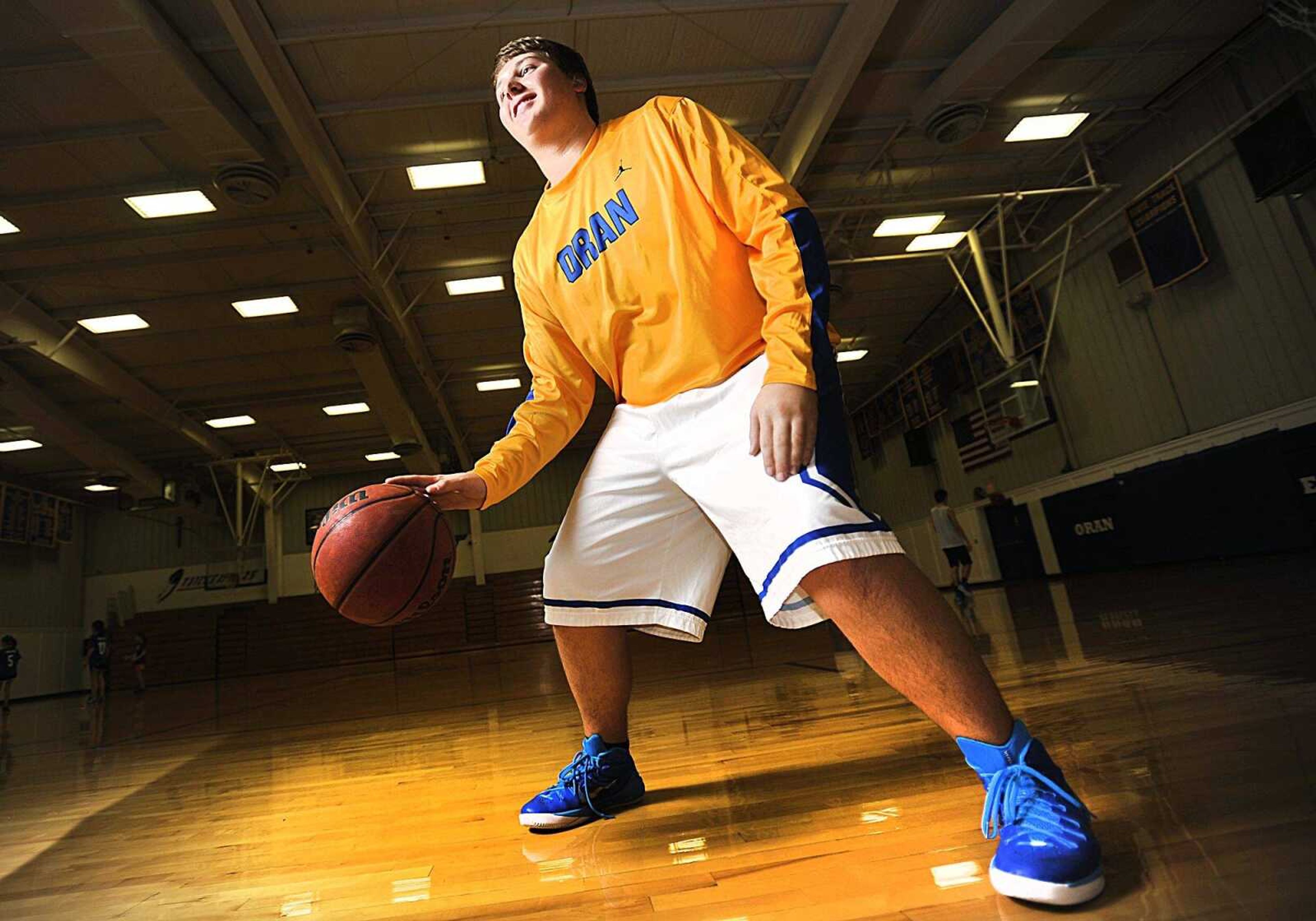Oran junior continues playing basketball after suffering devastating injury
Blake Schlitt lost his left hand a little over a year ago, but he never even considered not returning to the Eagles' basketball team.
Something about basketball has always intrigued Blake Schlitt.
Schlitt first picked up a basketball at the age of 5, and looking back, he's not sure if it was the color of the ball, the sound it made when it hit the wooden court or the thrill of scoring a basket that drew him to the game.
But the one thing he's sure of is that the sport has remained a part of his life and probably always will.
Now a junior on the Oran boys basketball team, Schlitt has a passion for basketball, playing in youth leagues throughout junior high and for the past two seasons in high school.
"Ever since I could dribble a basketball, there's been one in my hands," Schlitt said. "I've always played and can't imagine not playing or being around it."
Last year, Schlitt's chances of ever playing basketball again almost ended on what started as an ordinary day.
On December 12, 2013, Schlitt was with many of his teammates and friends at a local church preparing dinner. The church was having an annual dinner, and as he had for many years before, Schlitt volunteered his time to help prepare the meal.
"We were cutting meat up for CYC [Cool Young Christians] church group, and I was grinding it up and caught my hand in it," Schlitt said. "That's about it, or at least all I remember. I got rushed to the hospital and, yeah.
"I try not to think about it that much."
Schlitt said he's lucky there was someone there to free his hand.
Jimmy Watkins -- an Oran volunteer fire fighter and member of the St. Louis Ambulance Service, who was also volunteering at the church -- came to Schlitt's rescue.
"He just knew how to do it," Schlitt said about Watkins. "He works for the ambulance department in St. Louis, so he knew what he was doing."
Schlitt said all four fingers on his left hand were severed, with just his thumb remaining. Immediately following the accident, he was rushed to a hospital in St. Louis where doctors had to amputate his hand at the wrist.
Schlitt spent the next 10 days in the hospital, where he received three skin graphs, two of which were rejected by his body. He spent three more months refraining from any activity with his left arm to make sure his wound had time to heal.
Oran coach Joe Shoemaker said his team was understandably shaken after the accident.
"It affected the team," Shoemaker said. "A majority of the team was there with him that day. It was a pretty devastating day."
The Eagles junior varsity squad, which Schlitt played on last season, didn't have much time to think about their emotions or reach out to their friend. Shoemaker said he met with his players the following day to talk things over but they also had to prepare to play in their third game of the season against Scott City.
Oran suffered a heart-breaking loss in five overtimes, but Shoemaker was proud of his team's effort.
"We went into five or six overtimes that night, so it made for a really long day and I commended him on that," Shoemaker said. "We remembered him in our team prayer before the game, and to come out and have a marathon game like that, it was tough on our kids emotionally to go through a swing of that. They did a good job, and the kids have all stuck with him. They're all close friends, so that helps things a lot."

Many athletes in Schlitt's position would find it hard to begin playing basketball again after going through such a traumatic experience, but his coaches said that's what sets him apart from others.
Oran assistant coach Chris Nichols, who was one of the first to contact Schlitt while he was riding in the ambulance to St. Louis, said he asked Schlitt about the idea of eventually returning to basketball. Nichols said he never imagined he would be able to come back and play his junior season, if at all.
"I was pretty shocked. He seemed OK," Nichols said after talking to Schlitt in a Facebook message. "He seemed to be fine. I asked him if there was anything I could do and kind of just asked him straight up if he thought he was going to play basketball again while he was driving up there, and he said, 'Yeah.'
"He never had any hesitation."
Schlitt remembers the visit with his coaches and communicating with Nichols on the ride to St. Louis and said the thought of not playing never crossed his mind.
"I actually messaged him on Facebook and told him I was going to play," Schlitt said. "I came to that conclusion right away. It was on the way up to St. Louis in the ambulance. There was never a doubt in my mind."
There were adjustments Schlitt had to make to his game, the most obvious being how to catch the ball without his left hand.
Once his three months of rest were up and everything had healed, he began playing basketball again. He wrapped his arm in a protective covering and played like it was any other day.
"I didn't use anything," Schlitt said. "I just learned to catch it more with my right hand."
Shoemaker said it was tough to watch Schlitt try to get back into a groove right away, but over time, he learned from his mistakes and coped with not having a hand.
"It was hard. I could see him making adjustments," Shoemaker said. "I remember one time he caught it and tried to dribble with his hand that was gone, and he just kind of laughed and said, 'That ain't going to work.' That's just how he played it off -- 'It ain't going to work.' And he figured out how to make it work the next time. That's the biggest thing. He's not let it become an obstacle, he's figured out how to work around it."
There was a time where he was doing just fine without a hand, but Schlitt said he had always wanted a prosthetic.
"My doctor told me I had to wait for all of the swelling to go down and that was about six months," Schlitt said. "We talked about prosthetics in July, but I didn't get fitted for one until some time in October."
After months of waiting, Christmas came a little bit early for Schlitt last Monday when he received his first prosthetic hand.
"I actually just got it this Monday," Schlitt said while showing off his brand new prosthetic hand with a proud grin. "We went to the doctor and got it. We had practice that night at 7 p.m., started practicing with it, showed coach and all the guys and tried to see if it would help me."
Shoemaker can see a difference in the way he plays and added that Schlitt has become a resounding example of what it means to succeed and persevere.
"He's somebody we use as an example," Shoemaker said. "We'll say, 'He can figure out how to do it with one hand. Come on, fellas. You've got two,' to the rest of our guys. He's one of those glue guys that kind of makes the team stick together, and I don't know where we'd be without him."

The forward did not score when he debuted his new prosthetic in ninth-seeded Oran's 54-52 loss to No. 8 Scott City in the opening round of the Southeast Missourian Christmas tournament at the Show Me Center on Friday, but in a consolation quarterfinal on Saturday against No. 16 Delta, Schlitt played 10 minutes, 34 seconds off the bench and scored five points in that span. His biggest points of the game came with 4:45 remaining in the game when he drained a 3 from the right corner of the court. Schlitt said he doesn't shoot 3s often but practices them enough to know he can't pass up an open look from beyond the arc.
"The last time we played Delta was like two weeks ago," Schlitt said. "Me and my friend, right before the game started we were shooting and I was like, 'I'm feeling it.' I told him that. We shot 20 of them and he beat me 20-19. I lost, but the best part is that he's a guard, so I let him have it."
While there was an adjustment period, Schlitt said he has gotten used to the new hand, thanks to a little help from his teammates.
"It wasn't hard catching it. Going to your left, you can't really do that, but that's it," Schlitt said. "They all know to throw it to my real hand, so I can get better, take good shots and help the team.
"There's not really any time where I'm down about it. All my friends and family have been here for me and they keep me going."
His friends and teammates Hunter Schlosser and Jacob and Max Priggel have been especially helpful to him in the past year.
"They've all helped me through everything," Schlitt said. "It could be just a pat on the back or like just motivating me in practice or a game or whatever. We're all pretty good friends, so it's like we're all there for each other."
There are still some things that Schlitt can't do, but for the most part they aren't things that affect his life in a big way or make him any different from any other high school basketball player. He insists that life hasn't changed much for him. He's also confident that his injury will never stop him from playing basketball.
"I can't tie my shoes still," Schlitt said with a laugh while pointing out that his coaches and teammates have to help him with that on game days and in practice. "I still can't do that, but that's about it really. I try to do everything I can and cheer everybody on."
Connect with the Southeast Missourian Newsroom:
For corrections to this story or other insights for the editor, click here. To submit a letter to the editor, click here. To learn about the Southeast Missourian’s AI Policy, click here.








